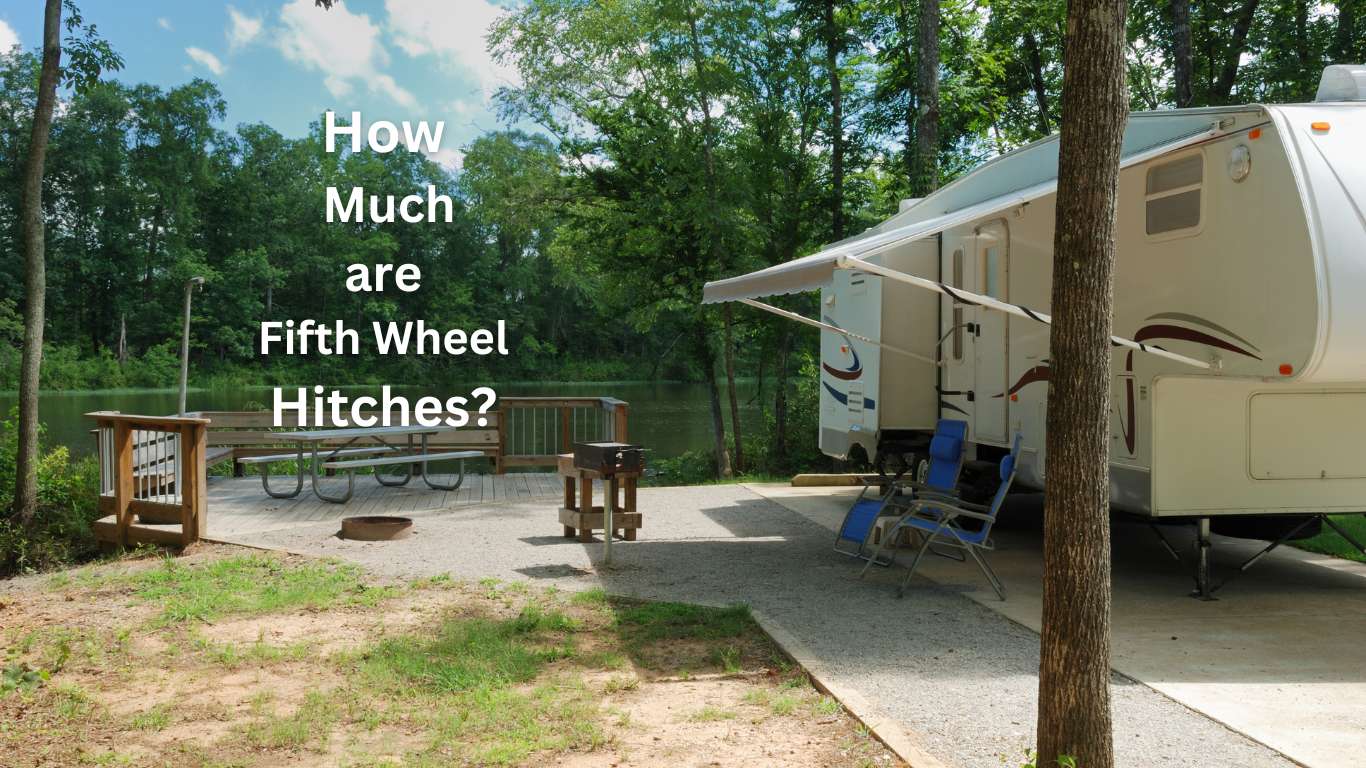When planning to tow a fifth-wheel camper trailer, understanding the cost of fifth-wheel hitches is crucial. These hitches are essential for safely and securely connecting your fifth-wheel camper to your towing vehicle. Prices for fifth-wheel hitches vary depending on several factors, including type, weight capacity, and brand.
Average Costs of Fifth Wheel Hitches
- Budget Models: $300 – $500
Entry-level hitches are suitable for smaller fifth-wheel camper trailers. However, they may lack advanced features. - Mid-Range Options: $500 – $1,200
These hitches balance affordability and durability, making them ideal for most fifth-wheel owners. - High-End Hitches: $1,200 – $3,000+
Advanced models from top brands, featuring state-of-the-art technology and high weight capacities, fall into this category.
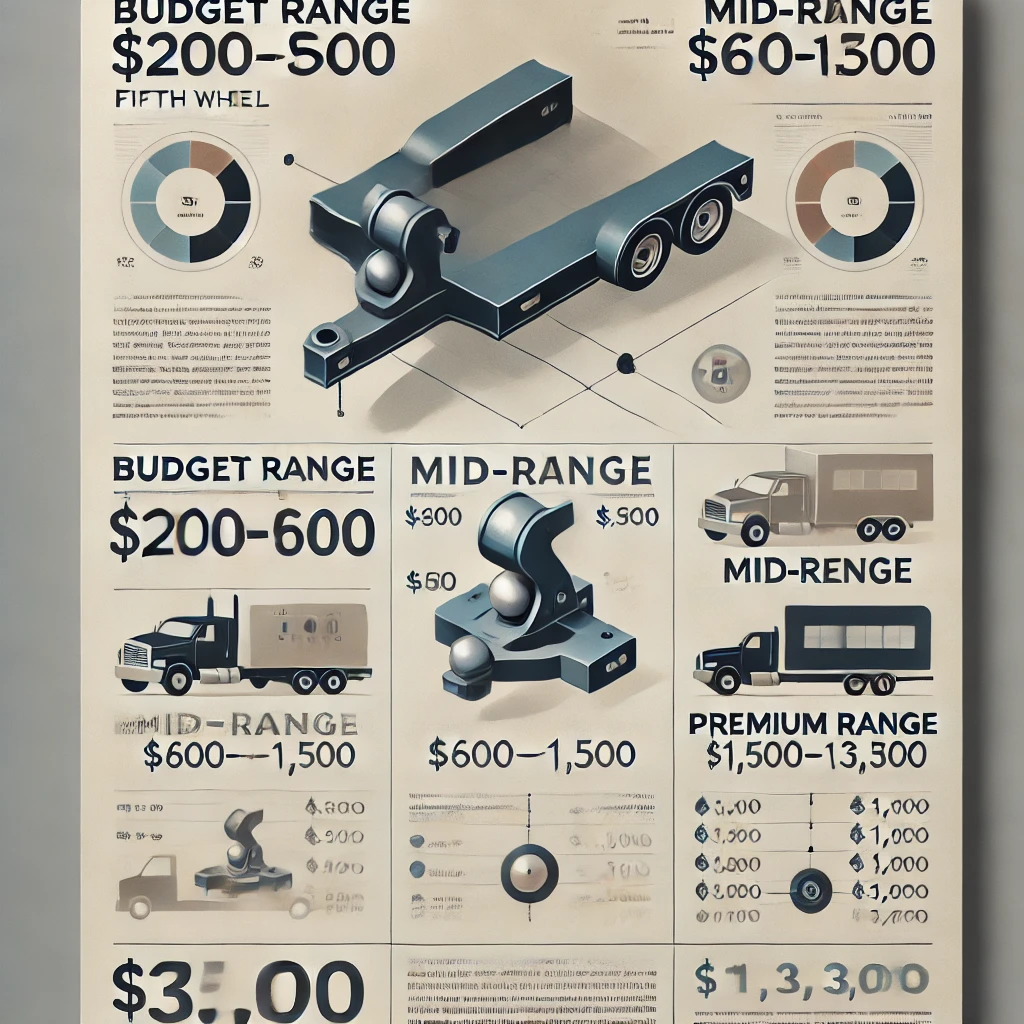
Additional Costs to Consider
- Installation Fees: If you prefer professional installation, expect to pay $150 to $500, depending on your location and the complexity.
- Accessories: Items like mounting rails or locking pins can add $50 to $200 to the overall expense.
Factors Affecting the Price of a Fifth-Wheel Hitch
The cost of a fifth-wheel hitch can vary significantly, depending on several factors. Whether you’re a budget-conscious buyer or seeking premium features, understanding these factors can help you make an informed decision.
1. Hitch Type
The type of hitch you need is one of the biggest price determinants.
- Fixed Hitches: These are more affordable, typically costing $300–$1,000.
- Sliding Hitches: Designed for short-bed trucks, these can cost $500–$3,000 due to their advanced sliding mechanisms.
- Gooseneck Adapters: These are less expensive alternatives for trucks with gooseneck hitches, ranging from $200–$800.
2. Weight Capacity
Higher weight capacities mean higher costs.
- Light-Duty Hitches: Suitable for smaller fifth-wheel trailers, priced around $300–$600.
- Heavy-Duty Hitches: Rated for larger trailers, these can cost $1,000 or more.
3. Brand and Build Quality
Reputable brands often command higher prices due to superior materials and craftsmanship.
- Premium Brands: Known for durability and reliability, these hitches can cost $1,500–$3,000.
- Budget Brands: More affordable options, but may lack advanced features, costing $300–$800.
4. Features and Technology
Additional features can significantly affect the price.
- Cushioning Systems: Reduce road vibrations but add $200–$500 to the price.
- Quick-Release Mechanisms: Allow for easy removal and typically cost $100–$300 extra.
5. Truck Compatibility
Trucks with factory-installed puck systems simplify installation and may reduce costs.
- Custom Brackets: Trucks without mounting points may require custom brackets, adding $100–$300 to the cost.
- Puck-Compatible Hitches: These can cost $800–$2,500, depending on the brand and features.
6. Installation Costs
The price of the hitch doesn’t include installation, which can vary widely.
- DIY Installation: Free if you have the tools and skills.
- Professional Installation: Adds $150–$500 to the overall expense.
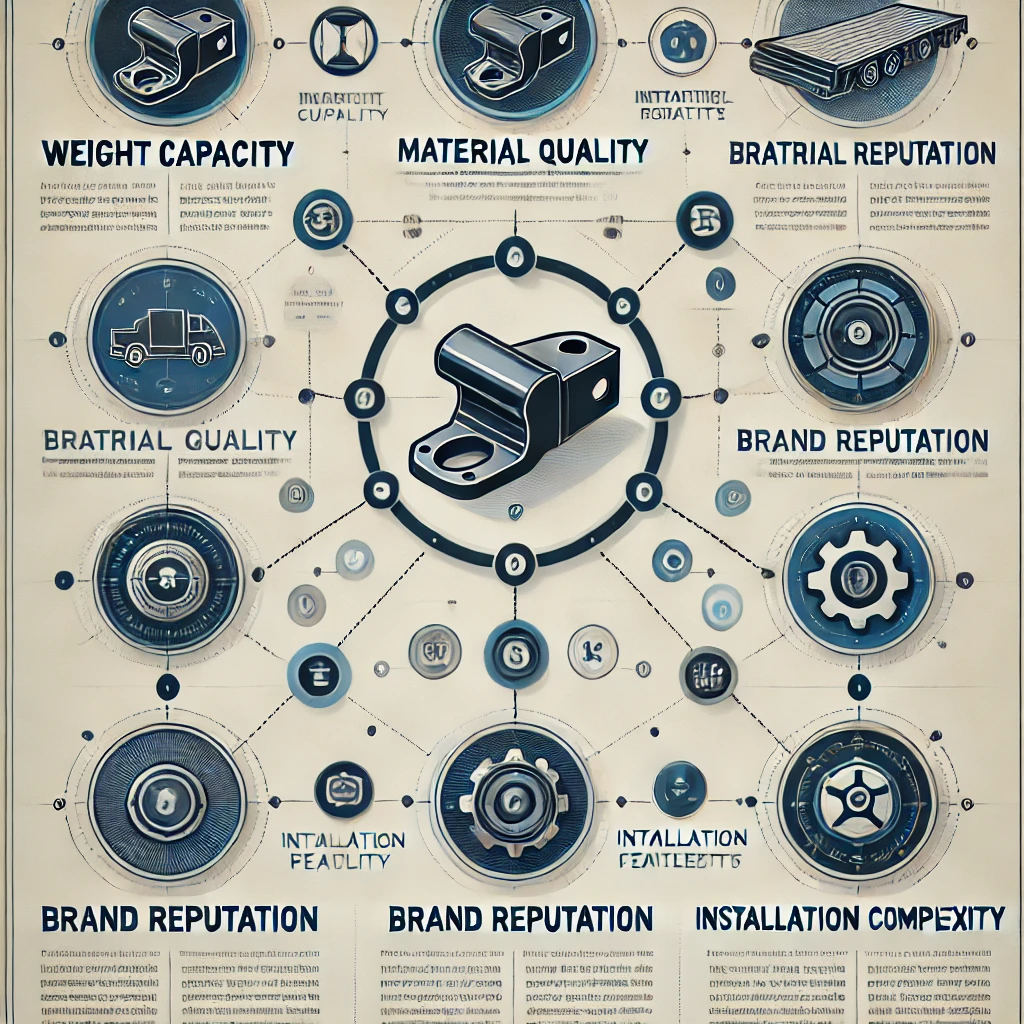
How Much Does It Cost to Install a Fifth Wheel Hitch?
Installing a fifth-wheel hitch is a critical step in preparing your vehicle to tow a fifth-wheel camper trailer. The cost of installation varies based on several factors, such as the hitch type, vehicle model, and whether you choose professional installation or a DIY approach.
Is Professional Installation Worth It?
While DIY installation is cost-effective, professional installation guarantees safety and proper alignment. For a hassle-free towing experience with your fifth-wheel camper trailer, investing in expert installation is a wise choice.
What Kind of Hitch Is Needed for a Fifth Wheel?
Towing a fifth-wheel camper trailer requires a specialized fifth-wheel hitch. Unlike standard ball hitches, these hitches mount in the truck bed, providing better stability and weight distribution for the heavier load of a fifth-wheel trailer. Choosing the right hitch depends on your truck, trailer, and towing needs.
Types of Fifth-Wheel Hitches
- Fixed Fifth-Wheel Hitch
- Best for: Long-bed trucks (8 feet or more).
- Features: Simple design, ideal for straightforward towing.
- Advantages: Affordable and easy to install.
- Sliding Fifth-Wheel Hitch
- Best for: Short-bed trucks (less than 8 feet).
- Features: A sliding mechanism to prevent the trailer from hitting the truck cab during sharp turns.
- Advantages: Essential for maintaining proper clearance with short beds.
- Gooseneck-to-Fifth-Wheel Adapters
- Best for: Trucks already equipped with a gooseneck hitch.
- Features: Converts a gooseneck setup to support fifth-wheel trailers.
- Advantages: Cost-effective if you already own a gooseneck hitch.
- Puck System-Compatible Hitches
- Best for: Trucks with factory-installed puck systems (e.g., Ford, RAM, or GM).
- Features: Drop-in design for quick installation and removal.
- Advantages: Clean, factory-integrated look.
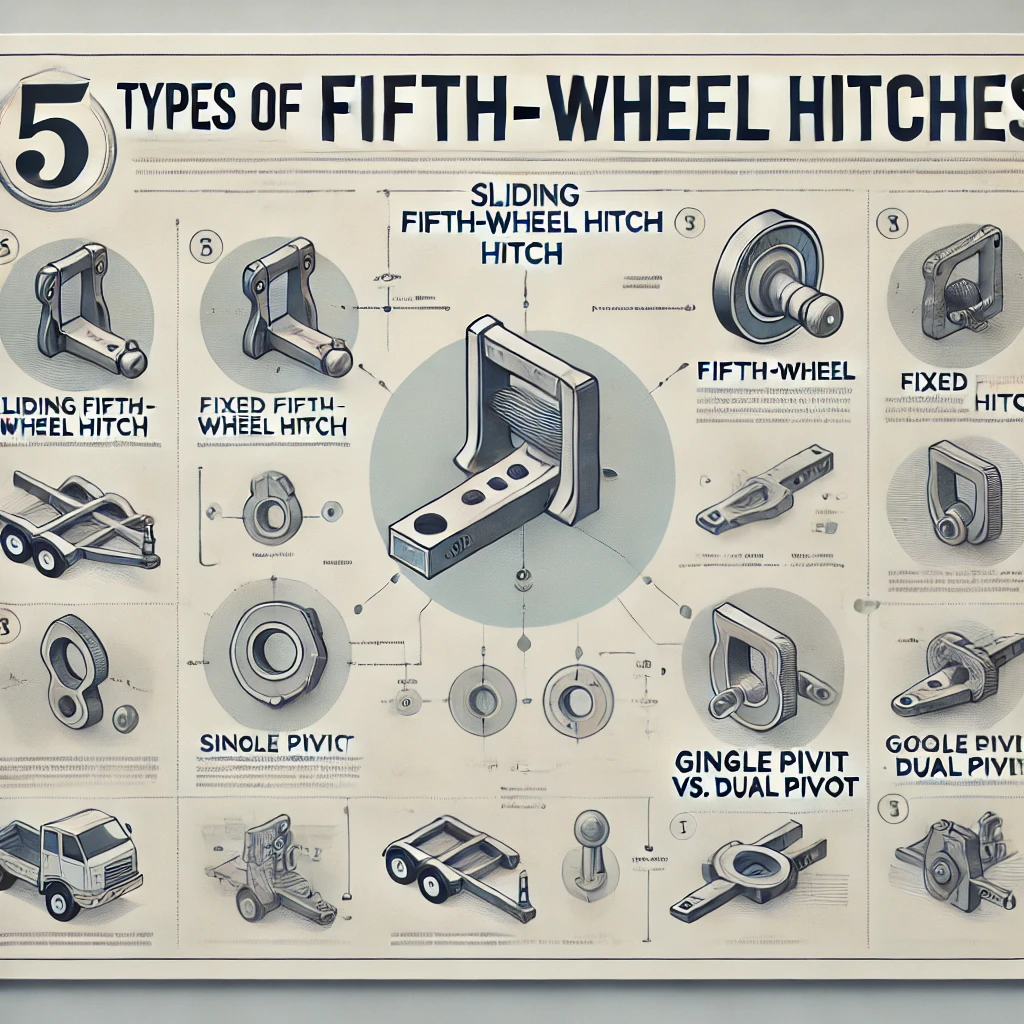
Key Considerations for Choosing a Fifth-Wheel Hitch
- Truck Bed Length
- Long beds can use a fixed hitch.
- Short beds require a sliding hitch for added clearance.
- Weight Capacity
- Match the hitch’s weight rating with your trailer’s gross vehicle weight rating (GVWR).
- Ease of Installation
- Factory puck systems simplify installation.
- If your truck lacks pre-installed mounting points, custom brackets or drilling may be required.
- Budget
- Entry-level models: $300–$500.
- Premium models with advanced features: $1,200 or more.
Benefits of Using the Right Hitch
- Enhanced towing stability and control.
- Reduced risk of damage to the truck or trailer.
- Compliance with safety standards for fifth-wheel towing.
In conclusion, a fixed hitch or sliding hitch is essential for towing a fifth-wheel camper trailer, depending on your truck’s bed length. For the best towing experience, ensure the hitch matches your trailer’s weight and your truck’s configuration. With the right hitch, your fifth-wheel towing adventures will be safe and hassle-free.
Prices of Fifth-Wheel Hitches for Different Classes of Fifth-Wheel Camper Trailers
The price of a fifth-wheel hitch depends on the class of the camper trailer you plan to tow. Fifth-wheel trailers vary in size, weight, and towing requirements, and the hitch must match these specifications. Here’s a breakdown of hitch prices based on the trailer class.
1. Light-Duty Fifth-Wheel Camper Trailers
- Typical Weight: Up to 8,000 pounds
- Ideal Hitch Type: Entry-level fixed hitches
- Price Range: $300–$800
- Features:
- Basic towing capacity
- Simple installation
- Ideal for smaller trucks and occasional towing
2. Mid-Range Fifth-Wheel Camper Trailers
- Typical Weight: 8,000 to 16,000 pounds
- Ideal Hitch Type: Fixed or sliding hitches
- Price Range: $800–$1,500
- Features:
- Higher weight capacities
- Optional pivoting head for smoother rides
- Sliding mechanisms for short-bed trucks
3. Heavy-Duty Fifth-Wheel Camper Trailers
- Typical Weight: 16,000 to 24,000 pounds
- Ideal Hitch Type: Premium fixed or sliding hitches
- Price Range: $1,500–$3,000
- Features:
- Advanced cushioning systems to reduce vibrations
- High weight ratings to support large trailers
- Enhanced stability and control for long-distance towing
4. Luxury Fifth-Wheel Camper Trailers
- Typical Weight: Over 24,000 pounds
- Ideal Hitch Type: Heavy-duty sliding hitches or specialty models
- Price Range: $2,500–$5,000+
- Features:
- Designed for extreme weight and stress
- Top-tier materials for durability
- Compatibility with advanced towing systems like puck setups
Additional Costs to Consider
- Mounting Rails or Brackets: $150–$300
- Installation (Professional): $150–$500
- Accessories:
- Cushioned pin boxes: $500–$1,000
- Hitch covers for protection: $50–$150
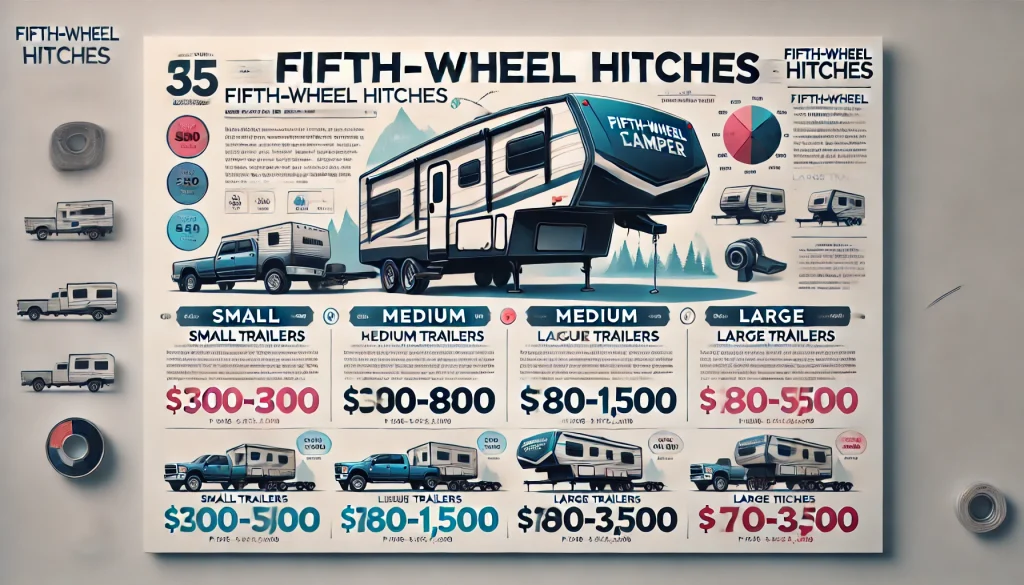
How Hard Is It to Install a Fifth Wheel Hitch?
Installing a fifth-wheel hitch requires careful planning, attention to detail, and the right tools. While it may seem intimidating for beginners, those with mechanical experience can manage it as a DIY project. The difficulty level depends on factors like your truck’s design, the hitch type, and your familiarity with tools.
Factors That Affect Installation Difficulty
- Truck Preparation
- Pre-Installed Mounting Points: Trucks with pre-installed puck systems or mounting rails make installation much easier.
- Custom Installation: If your truck lacks these features, you may need to drill into the bed, which requires precision and can be challenging.
- Type of Fifth-Wheel Hitch
- Fixed Hitches: These are relatively straightforward to install.
- Sliding Hitches: Designed for short-bed trucks, sliding hitches often involve more components, making the process more complex.
- Tools and Equipment
Basic tools like wrenches, socket sets, and torque wrenches are essential. A friend to help lift and position the hitch can make the process smoother.
Step-by-Step Overview of Fifth Wheel Hitch Installation
- Position the Hitch
Place the hitch base in the truck bed according to the manufacturer’s instructions. - Secure the Mounting Rails
If your truck doesn’t have pre-installed rails, measure, drill, and bolt them into place. - Attach the Hitch
Secure the hitch to the mounting rails, ensuring all bolts are tightened to the specified torque. - Test the Connection
After installation, test the hitch’s connection to ensure proper alignment and functionality.
DIY vs. Professional Installation
- DIY Installation:
- Difficulty: Moderate to hard
- Recommended for those comfortable with tools and detailed instructions.
- Benefits: Cost savings and a sense of accomplishment.
- Professional Installation:
- Difficulty: None for you, as an expert handles the process.
- Benefits: Ensures correct alignment and safety, ideal for complex setups or beginners.
Tips for Simplifying Installation
- Refer to the hitch manufacturer’s guide for detailed instructions.
- Use high-quality tools and verify torque settings to ensure secure connections.
- Seek assistance if the hitch is heavy or requires precise positioning.
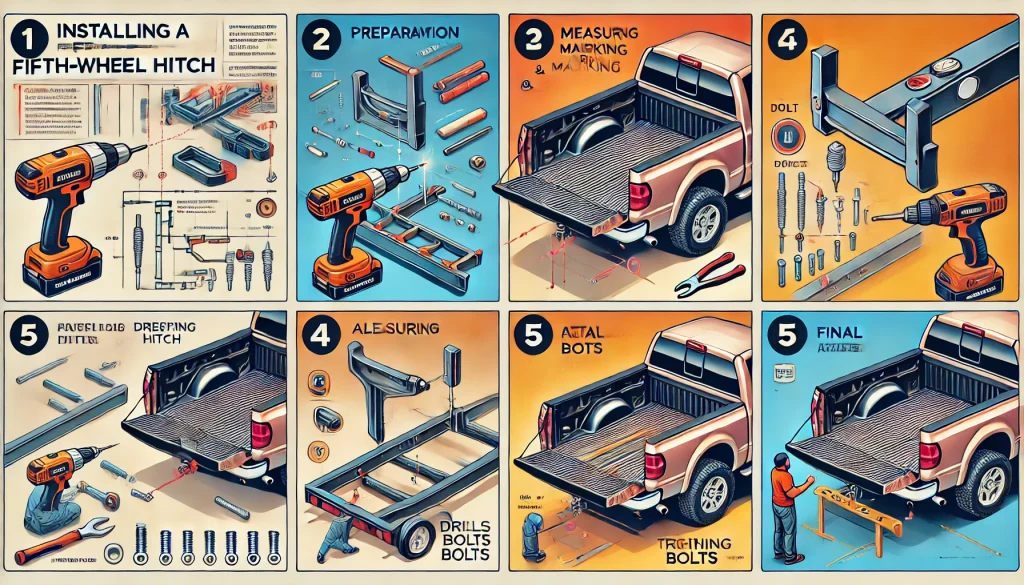
What Are the Disadvantages of a Fifth Wheel Hitch?
While fifth-wheel hitches are essential for towing fifth-wheel camper trailers, they come with some disadvantages. Understanding these drawbacks can help you decide if a fifth-wheel setup suits your towing needs.
1. Limited Truck Bed Space
A fifth-wheel hitch takes up significant space in the truck bed, leaving less room for other cargo.
- Impact: You may need to remove the hitch when not in use.
- Solution: Consider a hitch with a quick-release mechanism for easier removal.
2. Complex Installation
Installing a fifth-wheel hitch can be challenging, especially for trucks without pre-installed mounting points.
- Impact: Custom brackets or drilling may be required, increasing installation time and cost.
- Solution: Opt for professional installation to ensure safety and proper alignment.
3. High Initial Cost
Fifth-wheel hitches are more expensive than standard ball hitches.
- Impact: Prices range from $300 to over $3,000, depending on features and weight capacity.
- Solution: Balance your budget with your towing needs by choosing a hitch that offers essential features without overspending.
4. Compatibility Issues
Not all trucks are designed to accommodate a fifth-wheel hitch.
- Impact: Short-bed trucks often require a sliding hitch, which is more expensive and complex.
- Solution: Verify your truck’s compatibility before purchasing a fifth-wheel trailer or hitch.
5. Reduced Maneuverability in Tight Spaces
Towing a fifth-wheel trailer with a fifth-wheel hitch can be tricky in tight areas like narrow roads or crowded campsites.
- Impact: Sharp turns may require extra care, especially with short-bed trucks.
- Solution: Use a sliding hitch or consider a smaller fifth-wheel trailer for better maneuverability.
6. Weight and Size Considerations
Fifth-wheel hitches are heavy and bulky, making them difficult to install, remove, or store.
- Impact: Requires additional effort and possibly assistance.
- Solution: Look for lightweight models or invest in storage solutions to keep your hitch secure when not in use.
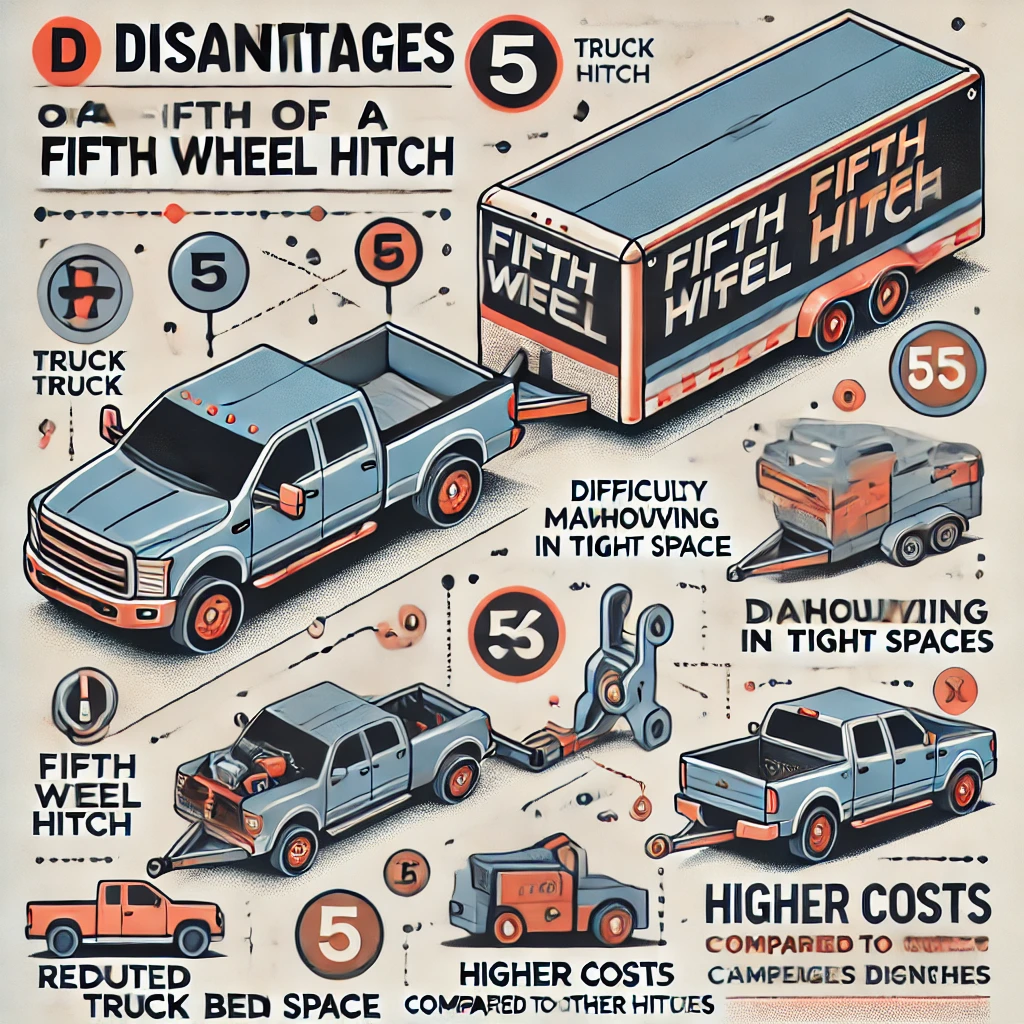
Essential Things to Consider Before Buying a Fifth-Wheel Hitch
Investing in a fifth-wheel hitch is a big decision, as it directly impacts your towing experience. Choosing the right hitch requires careful evaluation of your truck, trailer, and towing needs. Below are the essential factors to consider before buying a fifth-wheel hitch.
1. Truck Bed Length
Your truck’s bed length determines the type of hitch you’ll need.
- Long Beds (8 feet or more): A fixed hitch is sufficient, offering simplicity and lower costs.
- Short Beds (less than 8 feet): You’ll need a sliding hitch to prevent the trailer from hitting the cab during sharp turns.
2. Towing Capacity
Ensure the hitch matches your trailer’s weight.
- Gross Vehicle Weight Rating (GVWR): Verify the hitch can handle your trailer’s maximum loaded weight.
- Truck Towing Capacity: Check your truck’s manual to ensure it can safely tow the combined weight.
3. Compatibility with Your Truck
Not all hitches fit every truck.
- Factory-Installed Puck Systems: If your truck has a puck system, choose a compatible hitch for easy installation.
- Custom Brackets: Trucks without pre-installed mounting points may require brackets or drilling, increasing costs.
4. Budget and Features
Hitches vary in price, so align your budget with your needs.
- Basic Models: Affordable and reliable for occasional use.
- Premium Options: Offer features like cushioning systems and quick-release mechanisms for frequent towing.
5. Ease of Installation
Consider whether you’ll install the hitch yourself or hire a professional.
- DIY Installation: Requires tools, experience, and time.
- Professional Installation: Costs extra but ensures proper setup and safety.
6. Maintenance Requirements
A hitch is a long-term investment that requires care.
- Lubrication Points: Look for models with accessible lubrication points for easier maintenance.
- Rust-Resistant Materials: Opt for hitches made of corrosion-resistant materials for durability.
7. Intended Use
Think about how often you’ll tow and the type of trailer you have.
- Light Use: A basic hitch may suffice for occasional towing.
- Frequent Towing: Consider advanced features like a pivoting head or cushioning for smoother rides.
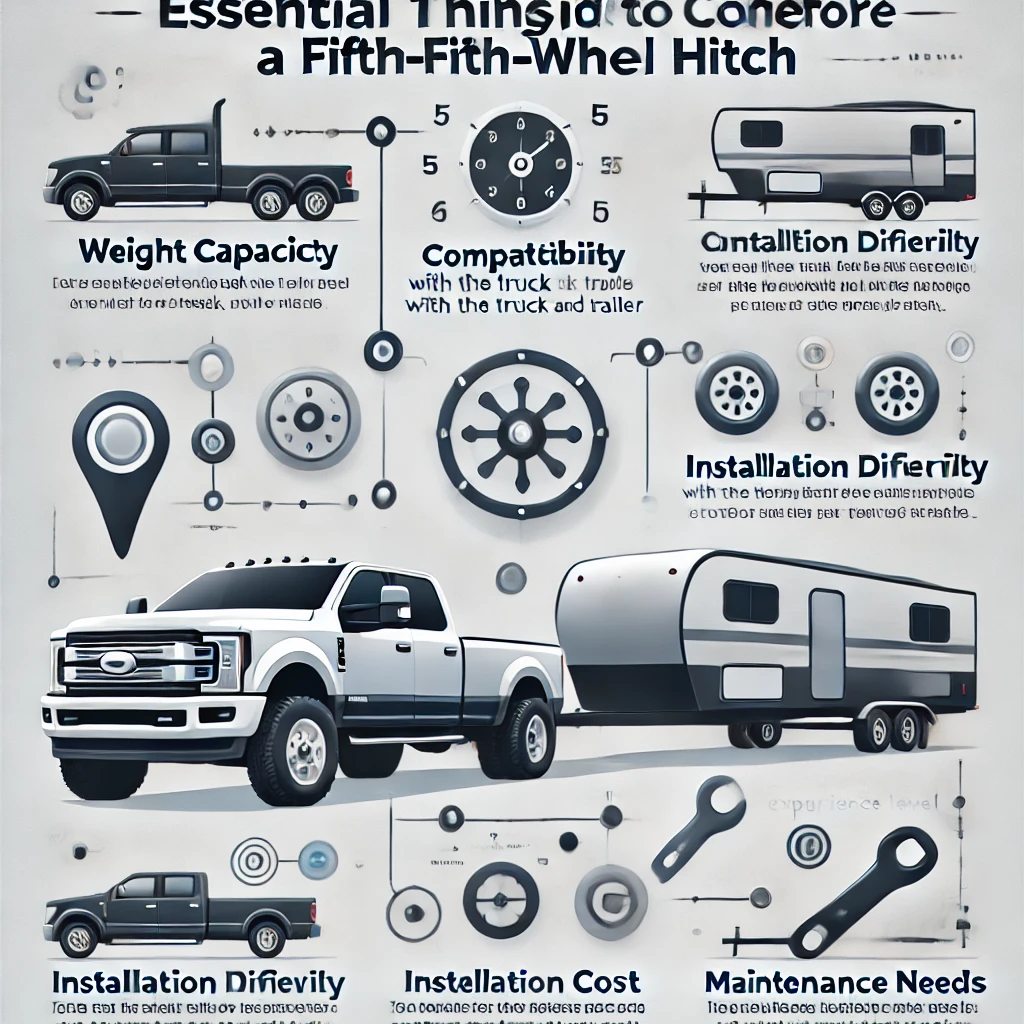
Common Mistakes When Buying a Fifth-Wheel Hitch
Choosing the right fifth-wheel hitch is essential for safe and efficient towing. However, many buyers make mistakes that can lead to poor performance, safety issues, or additional expenses. Avoid these common pitfalls when purchasing your fifth-wheel hitch.
1. Not Matching the Hitch to the Truck Bed Length
Your truck’s bed length significantly impacts hitch selection.
- Mistake: Using a fixed hitch with a short-bed truck can cause the trailer to collide with the cab during turns.
- Solution: Choose a sliding hitch for short-bed trucks to maintain adequate clearance.
2. Ignoring Weight Ratings
Weight ratings are critical for towing safety.
- Mistake: Selecting a hitch with a lower weight capacity than your trailer’s Gross Vehicle Weight Rating (GVWR).
- Solution: Ensure the hitch and truck can handle the fully loaded weight of your trailer.
3. Overlooking Truck Compatibility
Not all hitches are compatible with every truck.
- Mistake: Buying a hitch without confirming whether it fits your truck’s mounting system.
- Solution: Check if your truck has a factory puck system or requires additional brackets for installation.
4. Focusing Solely on Price
While budget is important, cheaper options may lack necessary features or durability.
- Mistake: Choosing a low-cost hitch that doesn’t meet your towing needs.
- Solution: Balance affordability with quality, ensuring the hitch is robust and reliable.
5. Skipping Professional Installation
Improper installation can compromise safety.
- Mistake: Attempting DIY installation without the proper tools or knowledge.
- Solution: Hire a professional installer if you’re unsure about the process, especially for complex setups.
6. Neglecting Future Towing Needs
Your hitch should accommodate potential upgrades or different trailers.
- Mistake: Buying a hitch with just enough capacity for your current trailer.
- Solution: Opt for a hitch with a higher weight capacity to future-proof your setup.
7. Forgetting Maintenance Requirements
Regular upkeep extends the lifespan of your hitch.
- Mistake: Ignoring lubrication points or allowing rust to develop.
- Solution: Choose a hitch with accessible maintenance features and perform routine checks.
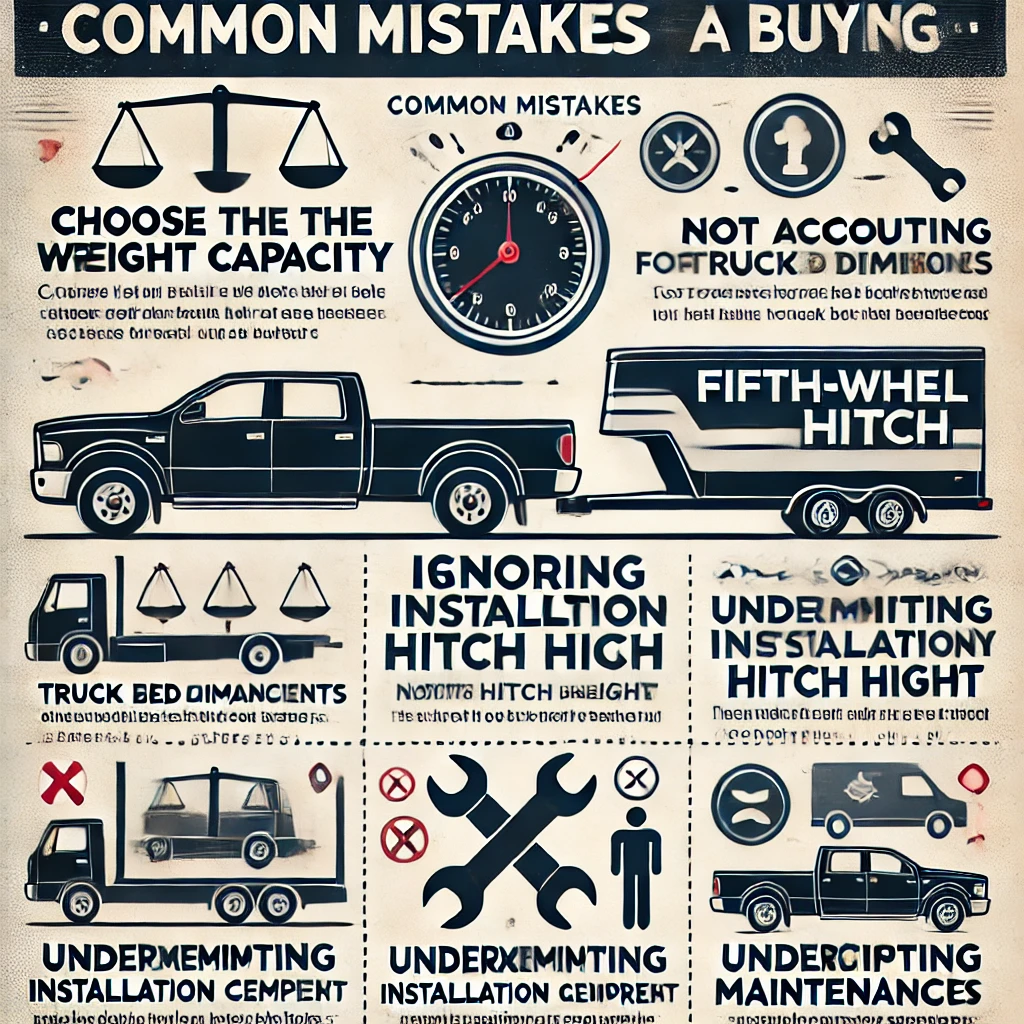
Conclusion
Avoiding these common mistakes when buying a fifth-wheel hitch can save you time, money, and frustration. Always match the hitch to your truck and trailer, consider weight ratings, and prioritize compatibility and quality. With careful planning, you’ll enjoy a safe and hassle-free towing experience.
More related details will be available on Flamingo Motorhomes.

